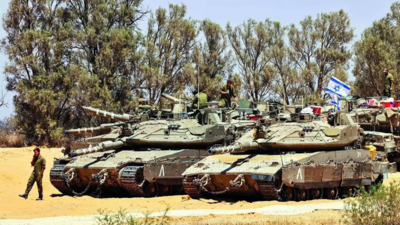
Israel occupies Gaza’s whole Egyptian border and advances into Rafah through raids
Israel now has effective control over the whole land border of the Palestinian territory as Israeli soldiers have taken over a buffer zone that runs along the Gaza Strip’s border with Egypt, the military announced on Wednesday.
Additionally, Israel persisted in its murderous strikes on the southern Gazan city of Rafah in defiance of an International Court of Justice ruling to cease operations on the area, where half of Gaza’s 2.3 million residents had earlier sought safety.
Chief military spokesman Daniel Hagari announced in a televised briefing that Israeli forces had achieved “operational” control of the “Philadelphi Corridor,” which is the code term used by the Israeli military for the 9-mile, 14-kilometer corridor that runs along the Gaza Strip’s sole border with Egypt.
“The Philadelphi Corridor served as an oxygen line for Hamas, which it regularly used to smuggle weapons into the area of the Gaza Strip,” stated Hagari. The armed Palestinian organization in charge of the blockaded area is called Hamas.
Although Hagari did not define “operational” control, an Israeli military official had before claimed that there were Israeli “boots on the ground” in certain areas of the corridor.
The only land boundary of the Gaza Strip that Israel did not directly control was the border with Egypt along its southern edge.
Israel launched tank incursions into Rafah earlier on Wednesday. On Tuesday, they had entered the center of Rafah for the first time, defying a ruling by the highest court of the United Nations to stop the attack on the city right now.
The World Court declared that Israel had failed to provide evacuees from Rafah with food, water, and medicine, as well as a safe haven. In addition, the court demanded that Hamas release the prisoners it had kidnapped from Israel on October 7 without delay or conditions.
Residents of Rafah reported that instead of holding their positions as they have in previous offensives, Israeli tanks retreated towards a buffer zone on the border with Egypt after pushing into Tel Al-Sultan in the west and Yibna and the area around Shaboura in the center.
“We received distress calls from residents in Tel Al-Sultan where drones targeted displaced citizens as they moved from areas where they were staying toward the safe areas,” stated Haitham al Hams, the deputy director of emergency services and ambulance in Rafah.
19 Palestinians have died as a result of Israeli bombings and shelling in Gaza, according to Palestinian health sources. The Islamist organization in charge of Gaza, Hamas, disputes Israel’s accusations that its fighters are hiding among civilians.
In light of the fact that people in the besieged Gaza Strip were dying from a lack of treatment, Health Minister Majed Abu Raman urged Washington to put pressure on Israel to open the Rafah gate to relief.
Israel’s National Security Adviser, Tzachi Hanegbi, said that Israel was not prepared to terminate the war as Hamas has sought as part of an agreement to exchange its hostages for Palestinian inmates. Fighting in Gaza will continue at least through 2024.
Hanegbi stated, “The fighting in Rafah is not a pointless war,” restating Israel’s goal of ending Hamas power in Gaza and preventing it and its allies from striking Israel.
According to U.S. Secretary of State Antony Blinken, Israel must prepare a post-war strategy for Gaza or face anarchy, lawlessness, and a return of Hamas to the territory.
The United States, Israel’s closest friend, stated once more on Tuesday that it opposes a significant ground effort in Rafah and that it does not think one is already underway.
Israel’s Gaza offensive has claimed the lives of over 36,000 Palestinians, according to the enclave’s health ministry.
According to Israeli estimates, terrorists headed by Hamas stormed villages in southern Israel on October 7, murdering about 1,200 people and taking over 250 captives. This was the catalyst for Israel to declare war.
CEASEFIRE TALKS ARE HARD TO DO
On Wednesday, there was no update on the status of the negotiations for the truce and hostage release. According to Hamas, negotiations are useless until Israel stops its attack on Rafah.
The armed wings of Islamic Jihad, an ally, and Hamas claimed to have successfully targeted multiple targets in Rafah by using mortar bombs and anti-tank rockets to combat the invading forces and defusing placed explosives.
According to the Israeli military, three Israeli troops died and three suffered serious injuries. A building in Rafah had an explosive device detonated, according to public radio Kan radio.
In eastern Rafah, where Palestinians claimed Israeli shelling had destroyed numerous homes in an area Israel had ordered evacuated, Palestinian health officials reported that several individuals had been injured by Israeli fire and that assistance stores had been set on fire.
The U.N. organization for Palestinian refugees, UNRWA, said on Tuesday that almost a million Palestinians who had sought safety in Rafah, at the southern tip of the Gaza Strip, have now left after receiving orders from Israel to leave.
The Palestine Red Crescent Society (PRCS) announced that because to the ongoing bombing, it had to evacuate its medical teams from its field hospital in the Al-Mawasi region, which is a designated civilian evacuation zone.
During a mission to rescue civilians in Rafah, an ambulance was struck, resulting in the deaths of two PRCS service members. Five other Palestinians, according to doctors, were killed in another Israeli airstrike on a house in Gaza City.
Salama Baraka, a former top Hamas police officer, was among the three individuals killed by an Israeli air attack in the nearby city of Khan Younis overnight, according to doctors and Hamas media. According to medics, another killed four individuals, two of them being youngsters.
Israeli soldiers shelled neighborhoods in Gaza City’s north and advanced forward into Jabalia, where locals claimed to have destroyed entire residential districts.
In Gaza, malnutrition has spread widely as relief supplies have virtually stopped flowing. Since Israel started attacking the Rafah region this month, the amount of humanitarian aid entering the enclave has decreased by two thirds, according to the U.N., which has issued hunger warnings.
All Categories
Recent Posts
Tags
+13162306000
zoneyetu@yahoo.com


